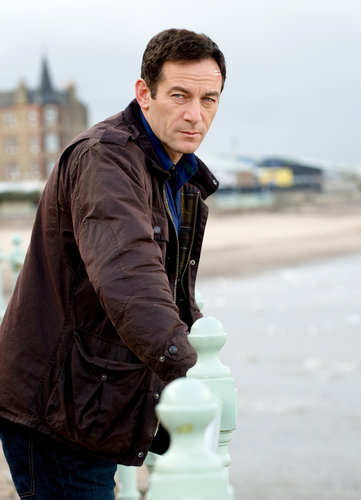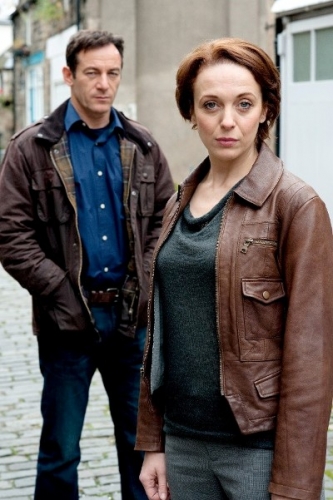 Scottish author Kate Atkinson’s cerebral novels about Jackson Brodie, a former cop turned private detective, gracefully make the transition to the screen in the three-episode Case Histories, as part of the Masterpiece Mystery! series now airing Sundays at 9 p.m. on PBS.
Scottish author Kate Atkinson’s cerebral novels about Jackson Brodie, a former cop turned private detective, gracefully make the transition to the screen in the three-episode Case Histories, as part of the Masterpiece Mystery! series now airing Sundays at 9 p.m. on PBS.
The first installment, based on the novel Case Histories, ran Oct. 16; One Good Turn is slated for Oct. 23; and When Will There Be Good News? will be on Oct. 30. Each episode is two hours. Check your local listings for time changes and encore showings. A DVD of all three episodes will be released by Acorn Media Nov. 8.
In the Case Histories series, Jason Isaacs, left, changes the long blond wig he wore as Lucius Malfoy in the Harry Potter movies for the jeans-wearing Jackson Brodie who does his best thinking while driving along the Scottish countryside. Brodie is the epitome of the insightful wounded private detective, haunted by his past, at odds with most of his former police colleagues and a soft touch for seemingly lost causes. Isaacs perfectly captures the brooding Brodie without making him a caricature.
Atkinson’s luxurious storytelling transitions well to the PBS series. While luxurious isn’t just another word for slow, Case Histories unfolds thoughtfully at a leisurely pace that emphasizes character rather than action.
Any crimes that affect children or women trigger Brodie’s memories of his sister’s murder that occurred when he was a boy. Brodie often relives that scene, a situation that is core to the novels but on screen seems, at least at first, confusing.
 In the first episode, Brodie takes on three cases. Two sisters, cleaning out the house of their recently deceased father, find a stuffed blue mouse in his desk. The toy was the favorite of their other sister who disappeared more than 30 years before. A grieving father (character actor Phil Davis) wants to know who murdered his daughter in his own office on her first day of work. The stranger showed up, stabbed her and then disappeared. And, in what seems like a tacked on plot, an aunt wants Brodie to find her niece who disappeared from foster care more than a decade ago. The child’s mother was in jail at the time for murdering her husband.
In the first episode, Brodie takes on three cases. Two sisters, cleaning out the house of their recently deceased father, find a stuffed blue mouse in his desk. The toy was the favorite of their other sister who disappeared more than 30 years before. A grieving father (character actor Phil Davis) wants to know who murdered his daughter in his own office on her first day of work. The stranger showed up, stabbed her and then disappeared. And, in what seems like a tacked on plot, an aunt wants Brodie to find her niece who disappeared from foster care more than a decade ago. The child’s mother was in jail at the time for murdering her husband.
In One Good Turn (Oct. 23), Brodie jumps into the Firth of Forth to retrieve the body of young woman who drowned. But Brodie loses the body and the police are reluctant to believe the body even exists. DCI Louise Munroe (Amanda Abbington, left with Isaacs), his one ally on the police force, is even more skeptical when Brodie seems to see the young woman walking around Edinburgh. A complicated set of other plot threads also are set in motion.
In When Will There Be Good News? (Oct. 30) Brodie wakes up in the hospital after trying to pull an elderly woman from a car that landed on railroad tracks. Brodie’s life has been saved by a whip-smart girl who wants the detective to find her missing employer. This novel is a personal favorite of mine and this episode shines with an emotional ending.
Case Histories does justice to Atkinson’s work but the filmed version points out flaws that erupt when print becomes film. Without Atkinson’s graceful prose, the first episode seems to rely too much on coicidence and stretches credibility. That Jackson has three similar cases in the first episode and is able to solve a 30-year disappearance and a weeks-old murder that have stumped the police seems unbelievable. Atkinson juggles several plot lines in her novels, which work for readers but may tax viewers’ comprehension.
But despite the production’s flaws, Atkinson’s storytelling shines. Supporting characters are richly explored, especially the sisters in the first episode; the teenager and a lunatic husband in the third episode.
Jason Isaacs, who also co-starred in Brotherhood, The State Within and other films and TV series, is quite familiar with Atkinson’s novels, having recorded several of the audio versions. He brings a sense of power and vulnerability to the role of Jackson Brodie.
He doesn’t recover quickly when he is beaten up. And he seems to genuinely care about his clients and finding them justice. A divorced father, he dotes on his daughter and we feel his pain when his ex-wife tells him she is taking a job in New Zealand. And, just to be frivolous, many of us enjoyed Isaacs’ frequent lack of a shirt.
The lovely soundtrack features lots of Nanci Griffin (a personal favorite), Lucinda Williams and Iris DeMent—all of which go well with the Brodie’s personality.
Case Histories airs at 9 p.m. Sundays on PBS as part of the Masterpiece Mystery! series. Episode 2, based on One Good Turn, on Oct. 23; Episode 3, based on When Will There Be Good News?, on Oct. 30. Episode 1, based on the novel Case Histories, aired Oct. 16 but is in reruns. Check your local listings. A DVD of all three episodes will be released by Acorn Media Nov. 8.
Photos of Jason Isaacs, top; Isaacs with Amanda Abbington, center. Photos courtesy PBS.




